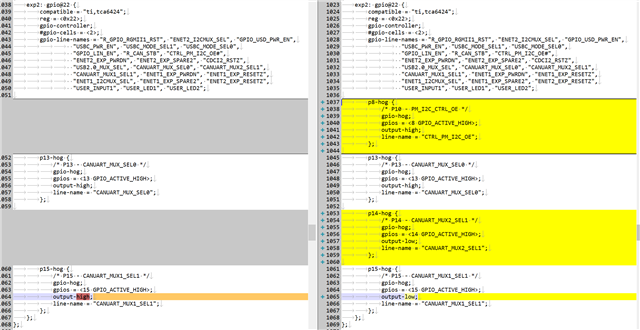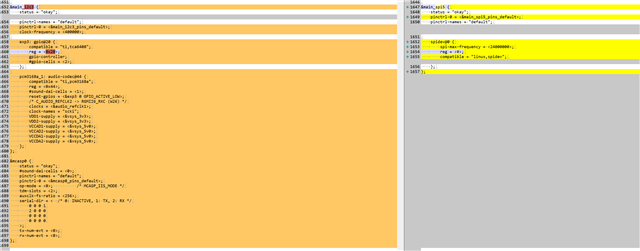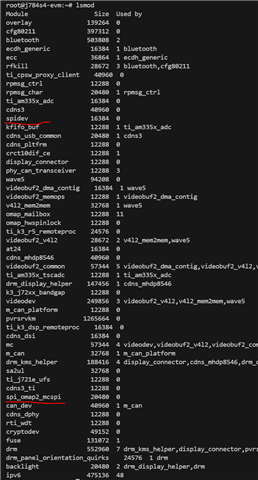Tool/software:
Hi Ti!
We used the sdk ti-processor-sdk-linux-adas-j784s4-evm-10_01_00_05 to test spi5 of J784S4-evm board ,
We had changed the dts file \board-support\ti-linux-kernel-6.6.44+git-ti\arch\arm64\boot\dts\ti\k3-j784s4-evm.dts , the diff is:
diff --git a/arch/arm64/boot/dts/ti/k3-j784s4-evm.dts b/arch/arm64/boot/dts/ti/k3-j784s4-evm.dts
index 56a037532..e8df2cea0 100644
--- a/arch/arm64/boot/dts/ti/k3-j784s4-evm.dts
+++ b/arch/arm64/boot/dts/ti/k3-j784s4-evm.dts
@@ -356,19 +356,6 @@ mux1: mux-controller {
mux-gpios = <&exp2 14 GPIO_ACTIVE_HIGH>;
idle-state = <1>;
};
-
- codec_audio: sound {
- compatible = "ti,j7200-cpb-audio";
- model = "j784s4-cpb";
-
- ti,cpb-mcasp = <&mcasp0>;
- ti,cpb-codec = <&pcm3168a_1>;
-
- clocks = <&k3_clks 265 0>, <&k3_clks 265 1>,
- <&k3_clks 157 34>, <&k3_clks 157 63>;
- clock-names = "cpb-mcasp-auxclk", "cpb-mcasp-auxclk-48000",
- "cpb-codec-scki", "cpb-codec-scki-48000";
- };
};
&wkup_gpio0 {
@@ -465,13 +452,6 @@ J784S4_IOPAD(0x0ec, PIN_OUTPUT, 6) /* (AN37) TIMER_IO1.USB0_DRVVBUS */
>;
};
- main_mcan4_pins_default: main-mcan4-default-pins {
- pinctrl-single,pins = <
- J784S4_IOPAD(0x088, PIN_INPUT, 0) /* (AF36) MCAN4_RX */
- J784S4_IOPAD(0x084, PIN_OUTPUT, 0) /* (AG38) MCAN4_TX */
- >;
- };
-
main_mcan16_pins_default: main-mcan16-default-pins {
pinctrl-single,pins = <
J784S4_IOPAD(0x028, PIN_INPUT, 0) /* (AE33) MCAN16_RX */
@@ -479,10 +459,15 @@ J784S4_IOPAD(0x024, PIN_OUTPUT, 0) /* (AH34) MCAN16_TX */
>;
};
- main_i2c3_pins_default: main-i2c3-default-pins {
+ main_spi5_pins_default: main_spi5_pins_default {
pinctrl-single,pins = <
- J784S4_IOPAD(0x064, PIN_INPUT, 13) /* (AF38) MCAN0_TX.I2C3_SCL */
- J784S4_IOPAD(0x060, PIN_INPUT, 13) /* (AE36) MCASP2_AXR1.I2C3_SDA */
+ J784S4_IOPAD(0x07c, PIN_INPUT, 8) /* (AJ38) MCASP0_AXR3.SPI5_CLK */
+ J784S4_IOPAD(0x068, PIN_INPUT, 8) /* (AE38) MCAN0_RX.SPI5_CS0 */
+ J784S4_IOPAD(0x064, PIN_INPUT, 8) /* (AF38) MCAN0_TX.SPI5_CS1 */
+ J784S4_IOPAD(0x054, PIN_INPUT, 8) /* (AD37) MCASP2_ACLKX.SPI5_CS2 */
+ J784S4_IOPAD(0x058, PIN_INPUT, 8) /* (AE37) MCASP2_AFSX.SPI5_CS3 */
+ J784S4_IOPAD(0x070, PIN_INPUT, 8) /* (AH38) MCAN1_RX.SPI5_D0 */
+ J784S4_IOPAD(0x088, PIN_INPUT, 11) /* (AF36) MCASP0_AXR6.SPI5_D1 */
>;
};
@@ -1049,6 +1034,14 @@ exp2: gpio@22 {
"ENET1_I2CMUX_SEL", "ENET1_EXP_SPARE2", "ENET2_EXP_RESETZ",
"USER_INPUT1", "USER_LED1", "USER_LED2";
+ p8-hog {
+ /* P10 - PM_I2C_CTRL_OE */
+ gpio-hog;
+ gpios = <8 GPIO_ACTIVE_HIGH>;
+ output-high;
+ line-name = "CTRL_PM_I2C_OE";
+ };
+
p13-hog {
/* P13 - CANUART_MUX_SEL0 */
gpio-hog;
@@ -1057,11 +1050,19 @@ p13-hog {
line-name = "CANUART_MUX_SEL0";
};
+ p14-hog {
+ /* P14 - CANUART_MUX2_SEL1 */
+ gpio-hog;
+ gpios = <14 GPIO_ACTIVE_HIGH>;
+ output-low;
+ line-name = "CANUART_MUX2_SEL1";
+ };
+
p15-hog {
/* P15 - CANUART_MUX1_SEL1 */
gpio-hog;
gpios = <15 GPIO_ACTIVE_HIGH>;
- output-high;
+ output-low;
line-name = "CANUART_MUX1_SEL1";
};
};
@@ -1620,12 +1621,6 @@ &main_mcan16 {
phys = <&transceiver2>;
};
-&main_mcan4 {
- status = "okay";
- pinctrl-names = "default";
- pinctrl-0 = <&main_mcan4_pins_default>;
- phys = <&transceiver3>;
-};
#define K3_TS_OFFSET(pa, val) (0x4+(pa)*4) (0x10000 | val)
@@ -1649,50 +1644,14 @@ &k3_clks {
pinctrl-0 = <&audio_ext_refclk1_pins_default>;
};
-&main_i2c3 {
+&main_spi5 {
status = "okay";
+ pinctrl-0 = <&main_spi5_pins_default>;
pinctrl-names = "default";
- pinctrl-0 = <&main_i2c3_pins_default>;
- clock-frequency = <400000>;
- exp3: gpio@20 {
- compatible = "ti,tca6408";
- reg = <0x20>;
- gpio-controller;
- #gpio-cells = <2>;
- };
-
- pcm3168a_1: audio-codec@44 {
- compatible = "ti,pcm3168a";
- reg = <0x44>;
- #sound-dai-cells = <1>;
- reset-gpios = <&exp3 0 GPIO_ACTIVE_LOW>;
- /* C_AUDIO_REFCLK2 -> RGMII6_RXC (W26) */
- clocks = <&audio_refclk1>;
- clock-names = "scki";
- VDD1-supply = <&vsys_3v3>;
- VDD2-supply = <&vsys_3v3>;
- VCCAD1-supply = <&vsys_5v0>;
- VCCAD2-supply = <&vsys_5v0>;
- VCCDA1-supply = <&vsys_5v0>;
- VCCDA2-supply = <&vsys_5v0>;
+ spidev@0 {
+ spi-max-frequency = <24000000>;
+ reg = <0>;
+ compatible = "linux,spidev";
};
-};
-
-&mcasp0 {
- status = "okay";
- #sound-dai-cells = <0>;
- pinctrl-names = "default";
- pinctrl-0 = <&mcasp0_pins_default>;
- op-mode = <0>; /* MCASP_IIS_MODE */
- tdm-slots = <2>;
- auxclk-fs-ratio = <256>;
- serial-dir = < /* 0: INACTIVE, 1: TX, 2: RX */
- 0 0 0 1
- 2 0 0 0
- 0 0 0 0
- 0 0 0 0
- >;
- tx-num-evt = <0>;
- rx-num-evt = <0>;
-};
+};
\ No newline at end of file
we used make linux-dts to compile it and update the dtb file to /boot/dts/ti ,
when check the /dev after reboot the board , we can not find a "spidev*" int /dev dir , any other changes we need to check ?








